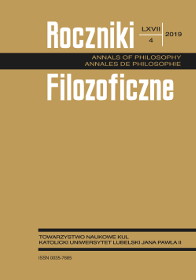The Analytical Thomist and the Paradoxical Aquinas: Some Reflections on Kerr’s Aquinas’s Way to God
The Analytical Thomist and the Paradoxical Aquinas: Some Reflections on Kerr’s Aquinas’s Way to God
Author(s): John F. X. KnasasSubject(s): Philosophy, History of Philosophy, Metaphysics, Philosophy of Middle Ages
Published by: Towarzystwo Naukowe KUL & Katolicki Uniwersytet Lubelski Jana Pawła II
Keywords: absolute consideration; esse; real distinction; Principle of Sufficient Reason; infinite regress; sensation; judgment
Summary/Abstract: My article critically evaluates five key claims in Kerr’s interpretation of Aquinas’s De Ente et Essentia, ch. 4, proof for God. The claims are: (1) the absolutely considered essence is a second intention, or cognitional being; (2) à la John Wippel, the real distinction between essence and existence is known before the proof; (3) contra David Twetten, Aristotelian form is not self-actuating and so requires actus essendi; (4) the De Ente proof for God uses the Principle of Sufficient Reason; (5) an infinite regress must be eliminated before concluding to God. This author wonders if these questionable claims are traceable to the mindset of analytic philosophy which values precision and discreteness and so can fail to appreciate crucial paradoxes in Aquinas’s metaphysics.
Journal: Roczniki Filozoficzne
- Issue Year: 67/2019
- Issue No: 4
- Page Range: 71-88
- Page Count: 18
- Language: English

